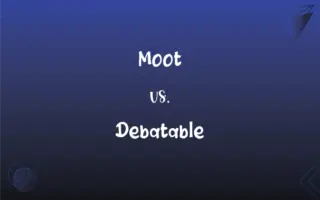Ambition vs. Aspiration: What's the Difference?
Edited by Aimie Carlson || By Janet White || Updated on September 29, 2023
Ambition refers to a strong desire for success, power, or wealth. Aspiration is a hope or ambition for achieving something specific, often more aligned with personal fulfillment or values.

Key Differences
Royalty is a term specifically reserved for individuals who are part of a royal family. These are the people who hold, or are eligible to hold, a kingdom’s highest titles such as king, queen, prince, or princess. Nobility, on the other hand, is a broader term encompassing individuals who are aristocrats but are not part of the immediate royal family. Members of the nobility may hold titles like duke, baron, or earl.
While both royalty and nobility enjoy special privileges and often live in luxury, their roles within a kingdom can vary considerably. Royalty usually has the highest level of authority, including legislative and sometimes even judicial powers. Nobility often serves in advisory roles or as regional rulers but do not hold as much power as the royalty.
Grammatically speaking, "royalty" is a collective and uncountable noun, which refers to the institution or group of royal family members. "Nobility" is also an uncountable noun, referring to a social class of people with hereditary titles, but not necessarily royal. Both words can be pluralized when referring to multiple royal or noble houses, such as "European royalties" or "ancient nobilities."
Historically, the lines between royalty and nobility were often blurred, especially when nobles married into royal families. However, the titles and roles have become more standardized over time. While both belong to the upper echelons of society, royalty typically inherits or assumes a level of responsibility and power that members of the nobility do not.
Ambition is often seen as a driving force that fuels a person's desire for success, power, or financial gain. It can be relentless and is generally considered a personality trait. Aspiration, on the other hand, is more about setting specific goals for personal or professional growth and is often tied to individual values and virtues. Both words indicate a form of desire, but their focuses diverge in meaningful ways.
ADVERTISEMENT
In many contexts, ambition is linked to competitiveness, as it frequently involves a quest for external validation or material achievement. Aspiration is not always competitive and may involve desires for self-improvement or moral growth, like aspiring to be kinder or more knowledgeable. Therefore, aspiration is often seen as more noble or virtuous compared to ambition.
From a grammatical standpoint, "ambition" and "aspiration" are both nouns, but they have slightly different connotations and usage. Ambition is often used in the context of career or worldly gains, while aspiration might be used in more personal and introspective conversations. However, the words can sometimes be used interchangeably, especially when the context allows for a broader interpretation of the terms.
Though both ambition and aspiration motivate action, the nature and consequences of those actions can differ. Ambition may lead someone to strive for a promotion at all costs, even if it compromises their values. Aspiration, conversely, would focus on achieving a goal in a manner consistent with one’s values, like aspiring to a position that enables one to make a positive impact on the community.
Comparison Chart
Definition
Members of a royal family
High-ranking aristocrats
Grammatical Category
Uncountable Noun
Uncountable Noun
ADVERTISEMENT
Roles
Highest authority
Advisory or regional roles
Common Titles
King, Queen, Prince, Princess
Duke, Earl, Baron
Power
Highest
Lesser than royalty
Connotation
Often competitive, external
More personal, often virtuous
Typical Context
Career, material gains
Personal growth, moral values
Focus
General desire for achievement
Specific goals
Ambition and Aspiration Definitions
Ambition
Members of a royal family.
The royalty attended the state banquet.
Aspiration
Persons who have been granted noble titles.
She was elevated to the nobility.
Ambition
Persons who hold the highest rank in a kingdom.
Royalty has the final say in legislative matters.
Aspiration
The quality of being noble in character.
His nobility was evident in his actions.
Ambition
The institution representing a nation's royal family.
The royalty issued a formal announcement.
Aspiration
The act of aspiring or aiming for something higher.
Her aspiration was noticeable in her dedication.
Ambition
Competitive drive in a particular field.
She had the ambition to be the best in her class.
Aspiration
A social class of high-ranking aristocrats.
The nobility advises the king.
Ambition
An overarching quest for achievement.
Their ambitions made them pioneers in technology.
Aspiration
A strong desire for self-improvement.
His aspiration for learning never ends.
Ambition
Individuals eligible for a throne.
The prince is next in line for the royalty.
Aspiration
Goals aligned with personal values.
His aspiration was to make a difference in his community.
Ambition
An eagerness for power or fame.
Her ambition for political office was evident.
Aspiration
A group with hereditary or honorary distinctions.
The nobility has a long history.
Ambition
An eager or strong desire to achieve something, such as fame or power.
Aspiration
Individuals with hereditary titles but not royal.
The nobility often owns large estates.
Ambition
The object or goal desired
Her ambition is the presidency.
Aspiration
A specific hope for achieving something.
Her aspiration is to write a bestselling novel.
Ambition
Desire for exertion or activity; energy
Had no ambition to go dancing.
Aspiration
Expulsion of breath in speech.
Ambition
Eager or inordinate desire for some object that confers distinction, as preferment, honor, superiority, political power, or fame; desire to distinguish one's self from other people.
My son, John, wants to be a firefighter very much. He has a lot of ambition.
Aspiration
The pronunciation of a consonant with an aspirate.
Ambition
(countable) An object of an ardent desire.
My ambition is to own a helicopter.
Aspiration
A speech sound produced with an aspirate.
Ambition
A desire, as in (sense 1), for another person to achieve these things.
Aspiration
The act of breathing in; inhalation.
Ambition
(uncountable) A personal quality similar to motivation, not necessarily tied to a single goal.
Aspiration
The act of drawing something, as liquid or a foreign object, into the respiratory tract when taking a breath.
Ambition
(obsolete) The act of going about to solicit or obtain an office, or any other object of desire; canvassing.
Aspiration
(Medicine) The process of removing fluids or gases from the body with a suction device.
Ambition
To seek after ambitiously or eagerly; to covet.
Aspiration
A strong desire for high achievement.
Ambition
The act of going about to solicit or obtain an office, or any other object of desire; canvassing.
[I] used no ambition to commend my deeds.
Aspiration
An object of such desire; an ambition.
Ambition
An eager, and sometimes an inordinate, desire for preferment, honor, superiority, power, or the attainment of something.
Cromwell, I charge thee, fling a way ambition:By that sin fell the angels.
The pitiful ambition of possessing five or six thousand more acres.
Aspiration
The act of aspiring or ardently desiring; an ardent wish or desire, chiefly after what is elevated or spiritual (with common adjunct adpositions being to and of).
Riley has an aspiration to become a doctor.
Morgan has an aspiration of winning the game.
Ambition
To seek after ambitiously or eagerly; to covet.
Pausanias, ambitioning the sovereignty of Greece, bargains with Xerxes for his daughter in marriage.
Aspiration
The action of aspirating.
Ambition
A cherished desire;
His ambition is to own his own business
Aspiration
(phonetics) A burst of air that follows the release of some consonants.
Ambition
A strong drive for success
Aspiration
The act of aspirating; the pronunciation of a letter with a full or strong emission of breath; an aspirated sound.
If aspiration be defined to be an impetus of breathing.
Ambition
Have as one's ambition
Aspiration
The act of breathing; a breath; an inspiration.
Ambition
A collective term for a kingdom's ruling family.
Royalty is often hereditary.
Aspiration
The act of aspiring of a ardently desiring; strong wish; high desire.
Vague aspiration after military renown.
Ambition
A strong desire for success.
His ambition drove him to work 80-hour weeks.
Aspiration
A will to succeed
Ambition
A goal or objective desired.
His ambition is to become a surgeon.
Aspiration
A cherished desire;
His ambition is to own his own business
Aspiration
A manner of articulation involving an audible release of breath
Aspiration
The act of inhaling; the drawing in of air (or other gases) as in breathing
Aspiration
Longing for moral or ethical growth.
She had an aspiration to be a better person.
FAQs
Can Nobility Become Royalty?
Historically, members of the nobility have married into royal families.
What is Nobility?
Nobility refers to high-ranking aristocrats but not royal family members.
Do Members of Royalty Hold More Power Than Nobility?
Generally, yes. Royalty usually has the highest level of authority.
Is Royalty a Collective Noun?
Yes, "royalty" is an uncountable noun that can refer to the royal family collectively.
Is Nobility a Collective Noun?
Yes, "nobility" is an uncountable noun referring to a class of aristocrats.
What are Common Titles for Nobility?
Common titles include Duke, Earl, and Baron.
What is Royalty?
Royalty refers to the members of a royal family, such as kings and queens.
Is Nobility Hereditary?
Usually, nobility is hereditary, but titles can sometimes be granted.
What are the Financial Privileges of Royalty?
Royalty often receives state funding and owns significant assets.
What are Common Titles for Royalty?
Common titles include King, Queen, Prince, and Princess.
Do Members of the Nobility Serve in Government?
Often, nobility serves in advisory roles or as regional rulers.
Is Ambition a Noun?
Yes, ambition is a noun.
How is Aspiration Usually Perceived?
It's often seen as virtuous and aligned with personal growth.
Can Ambition Be Measured?
Not easily, as it's a subjective trait.
What are the Financial Privileges of Nobility?
Nobility may own large estates or have other forms of wealth.
Is Nobility the Same as Gentry?
No, gentry are below nobility and often don't have titles.
Are Ambition and Aspiration the Same?
No, ambition is often more competitive and broad, while aspiration is specific and personal.
Is Ambition Always Negative?
No, ambition can be positive when channeled constructively.
Is Aspiration More Altruistic?
It can be, especially when tied to ethical or moral goals.
Does Ambition Have to Be Career-Related?
No, but it often is.
Is Royalty the Same in Every Country?
No, the roles and titles of royalty can vary from one country to another.
Can You Lose Your Royal or Noble Status?
Historically, it’s possible through acts of treason or changes in governance.
Is Aspiration Better Than Ambition?
Not necessarily, each serves different purposes and contexts.
Is Aspiration a Noun?
Yes, aspiration is also a noun.
Can Ambition and Aspiration Coexist?
Absolutely, one can have both ambitions and aspirations.
What is Ambition?
Ambition is a strong desire for success, power, or wealth.
What is Aspiration?
Aspiration is a hope for achieving something specific, often tied to personal values.
How is Ambition Usually Perceived?
It's often linked to competitiveness and material gain.
Can Aspiration Be Achieved?
Yes, it's generally a specific goal or set of goals.
Does Aspiration Have to Be Personal?
Not always, but it usually involves personal values or growth.
About Author
Written by
Janet WhiteJanet White has been an esteemed writer and blogger for Difference Wiki. Holding a Master's degree in Science and Medical Journalism from the prestigious Boston University, she has consistently demonstrated her expertise and passion for her field. When she's not immersed in her work, Janet relishes her time exercising, delving into a good book, and cherishing moments with friends and family.
Edited by
Aimie CarlsonAimie Carlson, holding a master's degree in English literature, is a fervent English language enthusiast. She lends her writing talents to Difference Wiki, a prominent website that specializes in comparisons, offering readers insightful analyses that both captivate and inform.






































































